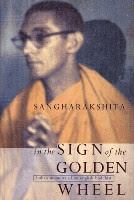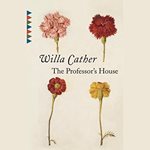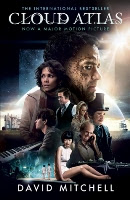Genome
by Matt Ridley
"Arguably the most significant scientific discovery of the new century, the mapping of the twenty-three pairs of chromosomes that make up the human genome raises almost as many questions as it answers."It's an old book, published back in 1999 when the human genome was close to being revealed, and was already out of date then. This is my second reading of this book, and a reminder of the incredible story of life on Earth, all of which uses the same building blocks of DNA bases. This fact completely blows my mind - what must it be like to have been the first to discover it?
In the Sign of the Golden Wheel
by Sangharakshita
"From his hermitage in the foothills of the Himalayas, Sangharakshita travels across India to a moving and dramatic climax—addressing hundreds of thousands of ex-Untouchables following the sudden death of their hero, the remarkable Dr Ambedkar, only weeks after their mass conversion to Buddhism."The third volume of autobiography, and as for the previous two there's an awful lot of day-to-day meeting people and listing of names, with a few slightly more exciting nuggets among the soup, like meeting the young Dalai Lama, and addressing the newly converted ex-Untouchables on the death of their leader, Dr Ambedkar. During this time came the writing of his first major work, The Survey of Buddhism, which I believe remains a seminal work.
Men at Arms
by Evelyn Waugh
narrated by Christian Rodska
"Guy Crouchback, determined to get into the war, takes a commission in the Royal Corps of Halberdiers. His spirits high, he sees all the trimmings but none of the action. And his first campaign, an abortive affair on the West African coastline, ends with an escapade which seriously blots his Halberdier copybook."I think this could be said to be 'of it's time', in that I'm not sure I got the most out of the story of a man trying to find a way to fight in the Second World War. There's probably a lot of subtle humour that I missed, given that I know nothing of army officers, commissions, ranks or anything of the sort. But it's another title ticked off the list of Classics (which includes nine titles by Evelyn Waugh).
The Professor's House
by Willa Cather
narrated by Sean Runnette
"On the eve of his move to a new, more desirable residence, Professor Godfrey St. Peter finds himself in the shabby study of his former home. Surrounded by the comforting, familiar sights of his past, he surveys his life and the people he has loved — his wife Lillian, his daughters, and Tom Outland, his most outstanding student and once, his son-in-law to be."When I leave big gaps between parts of an audio book I often find it difficult to pick up the story again, but I listened to this in only a few sittings including a long drive, and this should have made the characters more distinct. But at the end of the book I didn't feel I'd learned anything or got to know any of the characters, and I couldn't even be sure that I'd really understood what the book was about. A pity, because I enjoyed the previous book from this author.
Cloud Atlas
by David Mitchell
"Six interlocking lives in a narrative that circles the globe and reaches from the 19th century to a post-apocalyptic future, then boomerangs back through centuries and space, returning by the same route in reverse to its starting point."
This book has a novel structure where each of six stories is half told before moving to the next, then returning to the second halves in reverse order. It could be quite an interesting idea except that there seemed no point to it - nothing significant was carried from one story to the next, and it would have been less confusing for the book simply to consist of six short stories, which were all perfectly self-contained and well formed.





No comments:
Post a Comment